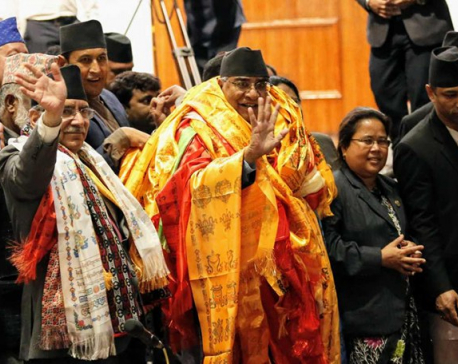
OR
Deuba as prime minister
Sher Bahadur Deuba, who turns 72 in a few days, has a great (and perhaps last) opportunity to resurrect his checkered political image and to establish for himself, warts and all, a legacy comparable to that of Girija Prasad Koirala, his one-time mentor and another four-time prime minister. It’s a tall order. Koirala’s contribution in the mainstreaming of the warring Maoists, spearheading the 2006 Jana Andolan and his steadying presence in that crucial first few years of political transition will be hard to match. The only way Deuba will come even close is if he can somehow hold all three sets of elections within the constitutionally mandated deadline of January-end 2018. For that will be the surest test of the implementation of the new constitution. Right now, it’s not even clear that the new prime minster will be able to successfully hold the second phase of local election now scheduled for June 28. This is because the Rastriya Janata Party Nepal (RJPN), a coalition of six small Madhesi parties, is yet to agree to take part in it. If the RJPN does not come around, the impact it could have on polling in the Tarai regions of the four provinces that vote on June 28 is hard to gauge.
Even if we for a moment assume that there can be an agreement with the RJPN in the next few days and it does take part in the June 28 vote, and that there will be free and fair election in most places on that day, even then the fate of the provincial and federal elections would be uncertain. If it is not possible to immediately amend the constitution, the Madhesi outfits that are supporting Deuba as new prime minister will seek credible assurance that amendment will quickly follow the second phase of local election. But the main opposition, CPN-UML, is dead against the idea of vastly increasing the number of local level units in Tarai-Madhes and against significant revisions to provincial boundaries—and it will be difficult to amend the constitution without UML’s support. If the task of boundary revisions is to be left to a future federal commission, what is the guarantee that this commission’s recommendations will be widely accepted? And what role, if any, will Prime Minister Deuba have in all this? How will he bring disparate forces like RJPN and UML, with polar opposite agendas, on the same page?
Frankly, people don’t expect much of Deuba, whose previous terms as prime minister have been marred by bribery scandals, open displays of nepotism and questionable loyalty to democratic values when he agreed to be hand-picked as prime minister by King Gyanendra. His recent meddling in the judiciary has also left a bitter taste in the mouth of Nepalis. But low expectations aren’t necessarily bad. Deuba can put the freedom he has as a result in trying to clear the hurdles to the three elections. Few politicians get repeated chances to leave a lasting imprint on national politics. With the county at such a crucial juncture as Deuba assumes office, a lot can still go wrong. Yet Deuba also has another chance to put so many things right in this country and to leave behind a potent political legacy. The old fox of Nepali politics might just prove his critics wrong.
You May Like This

Deuba back in Baluwatar for fourth time
KATHMANDU, June 6: Nepali Congress (NC) President Sher Bahadur was elected prime minister of the country on Tuesday. As Deuba... Read More...

Full time lawyer, part time youtuber
You might have come across Random Nepali. He’s a youtuber who makes presentation like animation videos that lists Nepali eccentricities... Read More...

Kirtipur makes stunning comeback to register fourth consecutive win
KATHMANDU, March 3: Kirtipur Basketball Team registered their fourth consecutive win in the ongoing first Kwiks Men’s Basketball League as... Read More...




Just In
- Health ministry to conduct ‘search and vaccinate’ campaign on May 13
- Indian customs releases trucks carrying Nepali tea, halted across Kakarbhitta
- Silent period for by-election to begin from midnight
- SC issues short-term interim order to govt and TU not to take immediate action against TU legal advisor Khanal
- National consultation workshop advocates to scale up nutrition smart community in Nepal
- Patan High Court issues short-term interim order to halt selection process of NTB’s CEO
- NEPSE inches up 0.15 points; daily turnover increases to Rs 2.53 billion
- Bagmati Govt mandates tri-lingual signboards in offices














Leave A Comment